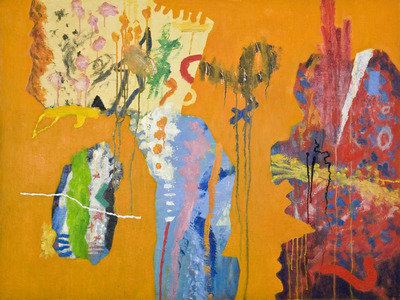David Heathcote
dal 23/3/2014 al 30/5/2014
Segnalato da
23/3/2014
David Heathcote
GV Art gallery, London
Numberless Islands. The exhibition focuses on two key elements of the artist's work: his treatment of figuration and abstraction.

Numberless Islands is a new solo exhibition by
David Heathcote.
A follow-up to 2011’s Beyond Horizons, which
showcased Heathcote’s wide repertoire, this
exhibition focuses on two key elements of the
artist’s work: his treatment of figuration and
abstraction. In so doing, it draws together
paintings, etchings and pencil studies which
examine the artist’s evolving language during
the course of his 60-year career.
In addition to works from Heathcote’s broad
career, the exhibition will show new abstract
landscapes.
An illustrated catalogue, containing an essay
with interview extracts, will accompany the
show, together with Heathcote’s film, Hausa Art
in Northern Nigeria (1978, 20 mins.
Forever ebbing and flowing between past and
present, and charted and uncharted places,
time is not linear in Heathcote’s paintings;
different moments, musings and embedded
feelings are seamlessly omnipresent. Only
occasionally do the titles of his works
fundamentally situate the scene, for example, as
Sahel, or Naples. Usually, places emerge in his
mind as a fusion of environments — as gardens,
deltas or the geographical sum of walks and
journeys.
Taken from the WB Yeats poem, The White
Birds (1892), the line “I am haunted by
numberless islands, and many a Danaan shore,
Where time would surely forget us, and Sorrow
come near us no more” evokes imaginative
escapism, freedom from constraints and
timelessness. The Danaan shore, or Tier-nan-
Oge, of Irish folklore, is an imaginary land of
everlasting youth and joy — and thus, for Yeats,
a metaphor for eternal and unconditional love,
Festival, 2009, oil on board
unbound by circumstance. The allusive seagulls
“buoyed out on the foam of the sea” personify
a freedom from the march of time, geographical
frontiers and human sorrow. Heathcote’s
Numberless Islands relays this sense of the
atemporal and metaphysical, as his paintings
are conceived through the inward vision of
memory and imagination alone. A multitude of
colours, textures and gestures are variously
conceived through subconscious thought: these
synaesthetic fragments are ‘cognitive short-cuts’
to his travels in Africa and beyond, and to
resurfacing feelings and poetic imaginings. Just
as recalling the rhythms and patterns of African
art has (obliquely) influenced his mark-making
and colours, Western poetry has stirred
Heathcote’s imaginings of foreign lands.
David Heathcote (born in London in 1931) grew up in Kent and studied at Canterbury College of Art
and the Slade. For twelve years he was in charge of Art History at Ahmadu Bello University, Nigeria.
He brought a major exhibition of Hausa Art to London in 1976 and completed a film on the subject in
1978. He has frequently had solo shows of creative work in London and abroad, most recently with GV
Art gallery in London and the Beckel Odille Boïcos Gallery in Paris. David has lived and worked in
Canterbury since settling there in 1979.
GV Art gallery, London fosters meaningful dialogues between contemporary artists and scientists. As
developments in art, science and technology are paving the way for new aesthetic sensibilities, GV Art
aspires to catalyse the exchange of ideas on the developments and intersections between art and science.
For press enquiries and images contact:
GV Art gallery, London on
T: 020 8408 9800 | E: media@gvart.co.uk
Private View : Thursday 24 April, 6pm – 9pm
GV Art gallery
49 Chiltern Street - London W1U 6LY
GALLERY OPENING HOURS
Tuesday to Friday 11am – 6pm
Saturdays 11am – 4pm
or by appointment.
Admission Free



